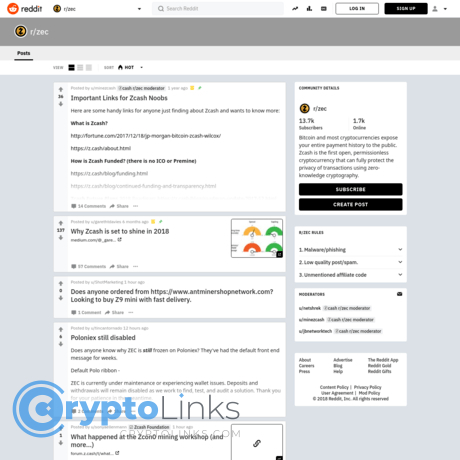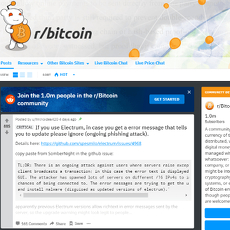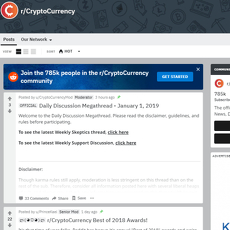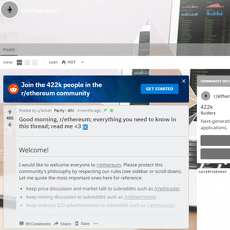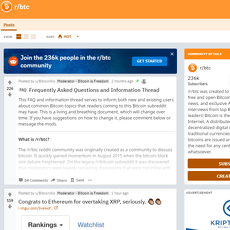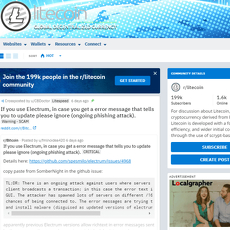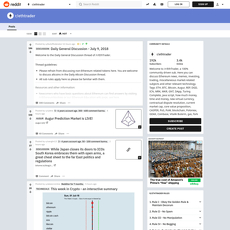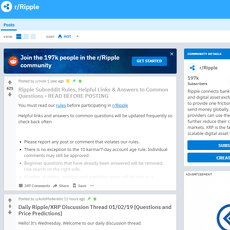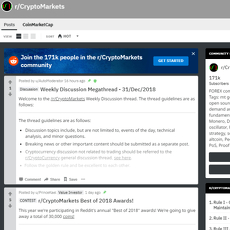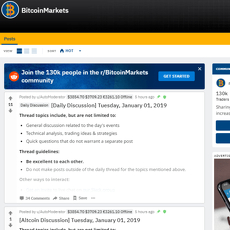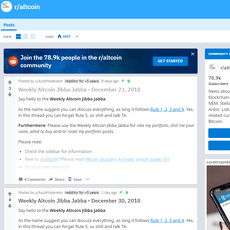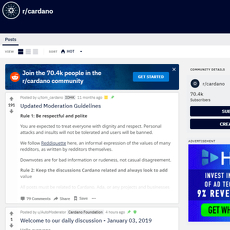r/zec Review
r/zec
www.reddit.com
r/zec Review Guide: Everything You Need To Know + FAQ
Ever open Reddit to learn something about Zcash and end up with 12 tabs, outdated threads, and zero clarity?
If you care about ZEC, r/zec can be a goldmine—if you know how to use it. The sub has solid people, helpful posts, and fast answers, but it also has the usual Internet problems: old info, hype, and the occasional sketchy link. I built this guide to cut through that noise so you can find what matters, ask smarter questions, and avoid bad takes.
The real problem: too many channels, not enough clarity
Crypto doesn’t suffer from a lack of information; it suffers from a lack of current information. Zcash adds an extra layer of complexity: wallet compatibility, shielded vs transparent behavior, ZIPs (Zcash Improvement Proposals), and network upgrades that can quietly change how things work.
Here’s what trips people up:
- Old threads that aged badly. Pre-NU5 advice can be flat-out wrong now. NU5 brought Halo proving, the Orchard pool, and set the stage for Unified Addresses—great upgrades, but they make older fixes and guides unreliable. See ECC’s NU5 post for context: NU5 mainnet activation.
- Wallet behavior isn’t uniform. Zashi, Nighthawk, YWallet, and exchange wallets don’t always handle shielded transactions or Unified Addresses the same way, and support changes over time. A “works for me” comment from 2022 may waste your weekend in 2025.
- Signal is scattered. Official info lives across ECC and Zcash Foundation blogs, the ZIPs repo, and the Zcash Community Forum—then gets echoed (sometimes incorrectly) on Reddit and X. Without a quick way to verify, it’s easy to act on bad advice.
Quick sanity rule: If a post doesn’t cite an official source for technical claims, treat it as a lead—not the answer.
What I promise you’ll get here
This guide is built to save you time. You’ll get:
- A clear, practical read on how r/zec actually functions day to day—what’s useful, what to skip, and how to avoid common traps.
- Smart navigation tips so you hit high-signal posts fast (sorting, search terms, and where the best info tends to live).
- Safety-first playbook for spotting scams, verifying downloads, and cross-checking claims with trusted sources like the ECC blog, Zcash Foundation blog, and the ZIPs repo.
- Actionable guidance on asking better questions (the kind that actually get answers) and contributing without getting ignored.
- A quick ZEC FAQ so you’re not stuck googling basics like “shielded vs transparent” or “what algorithm does ZEC use?” while you’re trying to parse a thread.
Who this guide is for and how I work
This is for anyone who wants r/zec to work like a tool, not a time sink—beginners who want trusted answers, privacy-focused users who care about doing things right, and power users who want a faster filter.
How I approach it:
- Source-first. I prioritize official posts and specs, and I link them so you can verify in seconds.
- Hands-on bias. I test supported wallets and compare what the docs say to what actually happens.
- No fluff. If something’s hypey, vague, or missing sources, I call it out or cut it.
- Safety over speed. I’ll nudge you to pause and verify when a claim could cost you money or privacy.
Ready to make the sub work for you? Up next, I’ll show you what r/zec actually is, who hangs out there, and how to read the room so you spot the best posts at a glance—curious who the regulars are and what they talk about each week?
What r/zec is (and who hangs out there)
r/zec is the home base on Reddit for people who care about Zcash and privacy that actually works in the real world. It’s a mix of hands-on users moving funds, wallet builders trying to make shielded transactions smoother, researchers tracking zk-SNARK progress, and a steady stream of contributors from the Electric Coin Co. (ECC) and the Zcash Foundation (ZF). You’ll feel the “privacy-first” bias everywhere—less hype, more practical talk about addresses, fees, wallets, and upgrades.
“Privacy is normal.”
That line pops up a lot, and it captures the culture. Conversations run technical when they have to, but people are surprisingly welcoming when you show you’ve done even a little homework.
What you’ll see week to week
Expect a steady cadence of updates, questions with real logs/screenshots, and active discussions about how to make ZEC useful day-to-day. On a typical week in r/zec, I see:
- Release notes and upgrade threads — zcashd 5.x bumps, Zebra node releases, and “should I upgrade now?” answers from people who already did.
- Wallet updates and bug reports — Zashi betas and hotfixes (official page), plus frequent posts from users of YWallet, Nighthawk, or Zingo! comparing sync speed, memos, and Orchard performance on different devices.
- ZIP discussions — clear explainers and arguments around proposals like ZIP 317 (fees), ZIP 316 (Unified Addresses), or governance ZIPs like 1014. Links usually go straight to the ZIPs repo so you can check the source.
- Privacy and UX conversations — what “shielded by default” should feel like, how long mobile proving should take, and whether exchanges are improving support for Unified Addresses.
- Governance notes — ECC and ZF blog cross-posts, grant updates, and community priorities from the Zcash Community Grants committee.
- Market context — price talk is there, but usually tied to real events (releases, network progress) rather than memes.
- Data snapshots — people share metrics on shielded usage, fees, and throughput with links to dashboards like z.cash/metrics.
It’s not wall-to-wall dev-speak. You’ll find everyday money moves too: “My exchange only shows t-addresses—how do I keep this private?”, “UA deposit worked, but withdrawal failed—what did I miss?”, “Fee looks higher than before—is that ZIP 317?” This is where r/zec shines: quick, reality-checked answers from folks who have tried it already.
Is it beginner-friendly?
Yes—if you bring a bit of context. The sub rewards specifics and punishes hand-wavy questions. When newcomers share details, they get fast, accurate help.
Here’s the format that consistently gets useful replies:
- Goal: “Send a shielded payment with a memo to a friend.”
- Setup: “Android 14, Zashi 1.x; funds came from Coinbase to a Unified Address.”
- What happened: “Transaction stuck at 0 confirmations for 20 minutes.”
- What I tried: “Restarted app, toggled Wi‑Fi/data, checked mempool in explorer.”
- Artifacts: “Screenshot of error (no keys/QRs), wallet version number, approximate time.”
People will often point you to the relevant ZIP, a known wallet issue, or a step-by-step fix. And if you’re brand new to Zcash addresses, the community will quickly clarify the basics without making you feel silly:
- Transparent (t-) addresses act like Bitcoin-style addresses and are widely supported by exchanges.
- Shielded (Orchard) live inside Unified Addresses (UA), which can hold multiple receivers. Some services still only accept t‑addresses, which is why you’ll see threads about “why did my UA deposit bounce?”
- Fees use ZIP 317’s recommendation, so you’ll see consistent small fees and occasional posts comparing costs across wallets.
How to get the most from the feed
I use a simple routine to turn r/zec from a noisy timeline into a learning tool:
- Sort by Top → Week or Month — this surfaces the most helpful releases, explainers, and bugfix threads without the hype.
- Search smart — try “zip 317”, “unified address exchange”, “zashi stuck pending”, “zcashd 5.* upgrade”, or “lightwalletd”. Add site:reddit.com/r/zec in Google for better results.
- Open the About panel — grab official links (ECC, ZF, ZIPs, forum) and keep them bookmarked. When a comment claims something big, jump to the source and sanity-check it.
- Skim comments for real-world proof — look for confirmations from multiple users across different OS/devices. A single fix that only works on one phone is a signal, but not the whole story.
- Save “anchor” threads — posts that clearly explain ZIPs, fees, and UA behavior will pay off over and over when you help others or troubleshoot later.
One more thing I love: many posts include exact versions, reproducible steps, and links to GitHub issues. That repeatable detail is rare in crypto subs—and it’s why r/zec threads age well. When you come back six months later, the context is still useful.
Curious how safe it is to trust what you see in r/zec, which scams get nuked fast, and which red flags still slip through? I’ll unpack the moderation style and the safety shortcuts next, with examples you can use the same day.
Rules, moderation, and safety: can you trust r/zec?
Short answer: yes—if you follow the rules and use common sense. The subreddit is actively moderated, tough on spam, and quick to nuke the obvious scams. It’s one of the cleaner crypto corners on Reddit. But safety isn’t something you outsource. You stay safe by playing your part.
“Security is a process, not a product.” — Bruce Schneier
What mods consistently get right
I’ve watched the mod team keep the sub usable without crushing real discussion. Here’s what stands out:
- Zero tolerance for shilling and giveaways. Posts that smell like “airdrop,” “double your ZEC,” or “limited-time liquidity mining” vanish fast.
- Push for on-topic threads. Tech and privacy talk are welcome; vague price hype isn’t. That balance keeps signal high for both builders and beginners.
- Health checks on links. Suspicious APKs, shortened URLs, and fake wallet pages are usually flagged or removed before they spread.
- Beginner-friendly moderation. New users asking real questions get room to learn, and bad advice gets challenged quickly by regulars.
Red flags I never ignore
Scams tend to rhyme. These are the patterns that show up again and again across crypto subs—and yes, you’ll see attempts on r/zec too:
- “Support” DMs out of the blue. Someone messages you right after you post a question? That’s a setup. Real contributors answer in public.
- Fake wallet downloads. Any post pushing an APK or off-store mobile build is risky. If it’s legit, you’ll find it on official sites or GitHub orgs you can verify.
- Seed phrase “verification.” No support team needs your seed. Ever.
- Too-good-to-be-true offers. “Send 0.5 ZEC, get 1 ZEC back” is always a trap. There’s no “special program,” just social engineering.
Why be so strict? Because social platforms are scam magnets. The FTC reports that more than half of investment-scam losses start on social media, with crypto a common hook (FTC Data Spotlight). Chainalysis also shows scams remain a dominant category of crypto crime revenue (Crypto Crime Report 2024). Translation: your caution is not paranoia—it’s best practice.
How I verify before I act (simple checklist)
- Check the poster. Click their profile. New account, no history, only posting links? Pass.
- Check the link. No shortened URLs. Domain should be clearly tied to the project (e.g., z.cash, electriccoin.co, zfnd.org, or GitHub orgs you can validate).
- Cross-reference claims. Use official sources:
- ECC Blog
- Zcash Foundation Blog
- ZIPs repository
- Zcash Community Forum
- Ask publicly, then wait. Post your question on the thread, not in DMs. Look for multiple aligned answers—not one confident hot take.
- Verify releases. For desktop software, confirm checksums and signatures on official repos. For mobile, use the real app stores and verify the publisher name (e.g., “Electric Coin Company” for Zashi). Avoid sideloading unless you know how to verify builds.
Real-world examples I’ve seen (and how to handle them)
- “Urgent Zashi patch—grab the APK here!” It’s almost always malware. Go to the official Zcash or ECC site, or the app store listing linked from those sites.
- “ECC support here, fill this form with your seed to restore funds.” No team will ask for that. Report the account and alert the mods via Report or Modmail.
- “Shielded faucet” that wants your private key to “prove ownership.” Hard no. Use faucets or test tools only from organizations you can verify through official channels.
- Price pump promises with a Telegram link. Classic exit liquidity play. If a post can’t cite a verifiable source, keep scrolling.
Smart settings and habits that save headaches
- Turn off unsolicited Chats/DMs. In Reddit settings, restrict who can message you. If someone really wants to help, they can do it in the thread.
- Never paste seeds. Not into Google Docs, not into “verification” sites, not into a browser extension. Write them on paper and store them offline.
- Use flairs and read rules. Post with the right flair (Support, News, Discussion) and follow the no-referral/no-giveaway policy. Your thread gets better responses when it’s framed right.
- Report quickly. If something feels off, hit Report. The mod team is active; you’re helping everyone.
I think about it this way: if a claim changes how you store funds or what you download, it deserves extra proof. Trust the community vibe, but validate the details. Now that you’re safe and set up, the obvious next question is—what content is actually worth your time on r/zec, and what should you skip?
Content quality: what’s worth your time (and what isn’t)
If you treat r/zec like a firehose, you’ll drown. If you treat it like a scanner for verified signals, you’ll be weeks ahead of most people. Here’s what consistently delivers value—and what I scroll past without a second thought.
“Signal beats noise when you can verify it yourself.”
Must-follow recurring posts
These threads not only inform you—they equip you. I make a habit of saving them:
- Official release announcements — Posts linking to zcashd releases, Zebra releases, or the ECC blog. Good posts summarize what changed (performance, fees, privacy UX) and add a short “what this means for users.”
- Wallet updates — Threads on Zashi, Nighthawk, or YWallet that include version numbers, platform coverage, and known issues with shielded transactions. The best ones link to release notes and show before/after behavior.
- ZIP discussions — Look for posts citing specific ZIPs (e.g., ZIP 316 for Unified Addresses, ZIP 1014 for funding/governance). Strong threads quote the relevant section and ask a clear question like “Does this change wallet interoperability on iOS?”
- Governance and grants — Announcements from the Zcash Foundation or ECC that point to blog posts or grants pages. Savvy commenters often add context about roadmap impact and timelines.
- Privacy explainers and use cases — Educational posts that show how to send shielded, handle Unified Addresses, or avoid UX pitfalls across exchanges and wallets. A good sign: screenshots with sensitive info redacted and step-by-step notes.
Quick heuristic: if a post includes a link to an official source, a summary in plain English, and a “what this means,” it’s probably worth your time.
Posts to skip or down-rank
There’s no shortage of noise. I filter hard using a simple checklist:
- Hype with no sources — “Big partnership soon,” “This will 10x” with zero links. If it doesn’t cite ECC, ZF, ZIPs, or code, I keep scrolling.
- Price-only speculation — Candle pics, laser eyes, and zero input on network utility. It doesn’t move you forward.
- Recycled or stale news — Articles with old dates repackaged as “breaking.” Check timestamps on blog posts and GitHub commits before engaging.
- Vague help requests — “Wallet not working, help” with no wallet name, version, OS, or error logs. These drain attention and rarely help the OP.
- Off-platform download links — APKs, “modded” wallets, or shortened URLs. If it’s not from an official site or repo, it’s a hard no.
Emotional reality check: your time is your only non-inflationary asset. Guard it. If a post doesn’t respect your attention with clarity and verifiable links, it hasn’t earned your click.
How to contribute well
Great questions get great answers. When I post, I use this template to save everyone’s time and get faster replies:
- Goal: what you’re trying to do (e.g., “Send a shielded transaction from mobile to a UA on desktop”).
- Environment: wallet name + version, device/OS, and region if exchange-related.
- Steps to reproduce: bullet the exact taps/clicks, including whether you used a UA or t-address.
- What happened: error message, stuck status, or unexpected fee/behavior.
- What you tried: app restart, rescan, smaller amount, different address type, or checking known issues.
- Screenshots/logs: redacted images; never share seed phrases or private keys.
- Links: add any relevant docs, like a wallet release note or related ZIP (e.g., link to ZIP 316 if your question touches Unified Addresses).
Sharing news? Make it actionable:
- Source: official link first (ECC, ZF, GitHub, or z.cash/learn).
- TL;DR: 1–2 sentences of what changed and who it impacts (miners, wallet users, exchanges).
- Why it matters: speed, fees, privacy guarantees, compatibility, or UX.
- What to watch: known issues, rollout timing, or migration steps.
One more pro tip: the best comment sections read like mini wikis. Look for replies that add code references, ZIP quotes, or links to prior threads—the “comment sniff test.” If the top comments are just emojis and hopium, it’s probably not a thread you’ll learn from.
Still unsure about the basics—like how shielded transactions actually work, what ZEC is used for in the real world, or which algorithm powers the network? Keep going—next up is a rapid-fire FAQ that answers those in plain English so you can spot quality even faster.
Quick FAQ: ZEC basics for r/zec newcomers
I see the same four questions pop up over and over. Here are the fast, no-nonsense answers I give people so they can get back to learning and actually using ZEC—safely.
“Privacy isn’t about hiding something wrong; it’s about protecting something right.”
How does ZEC work?
Zcash has two rails for transactions:
- Transparent (t‑addresses): work like Bitcoin—sender, recipient, and amount are public.
- Shielded (z/UA): private by default using zk‑SNARKs, so the network can verify your transaction without exposing who you paid or how much.
Modern wallets use Unified Addresses (UA) that can receive across pools, including the latest Orchard shielded pool. This keeps things simple: you share one address, your wallet figures out the rest. If you need audits or accounting, you can share a viewing key to reveal incoming activity without touching your funds.
Real-world example I point new folks to on r/zec:
- Buy ZEC on an exchange that only supports transparent withdrawals.
- Withdraw to your UA in a wallet that supports shielded.
- From your wallet, send a shielded transaction to your friend (or to your own cold wallet) with a memo.
Friendly primers and deeper reads:
- Zcash overview on Yahoo Finance – quick, non-technical orientation.
- Unified Addresses – how one address handles multiple pools.
- Halo 2 and Orchard – the proving system and the current shielded pool.
- Zerocash paper (Ben‑Sasson et al.) – the academic roots of Zcash’s privacy.
What is ZEC used for?
Anytime you want payments without broadcasting your life on a public ledger.
- Private person‑to‑person payments with a memo for context (rent, family support, reimbursements).
- Donations where recipients don’t want donor lists scraped from a blockchain.
- Business workflows that need selective disclosure: share a viewing key with an auditor, not the whole world.
Why people care: chain analysis firms routinely map public ledgers; a 2023 paper in Proceedings on Privacy Enhancing Technologies showed how simple metadata can deanonymize naively “private” flows on transparent chains. Shielded ZEC avoids that pattern by default while still settling on a public network.
- CoinMarketCap’s ZEC intro – clear summary of use cases and design.
What algorithm is ZEC?
Zcash uses Equihash with Proof‑of‑Work, a 21M max supply, and halvings roughly every four years. ASIC miners exist for Equihash, and block times target roughly a minute‑plus, which keeps confirmations quick for everyday use.
- Supply mechanics: similar schedule to Bitcoin (fixed cap + halvings) to protect long‑term scarcity.
- Mining reality: today it’s ASIC‑dominated; home GPU miners will struggle on cost unless electricity is unusually cheap.
Context and technical/economic background worth bookmarking:
- Galaxy Research – coverage on privacy assets and PoW economics.
- Zcash technology overview – consensus, pools, and upgrades.
How do I get ZEC?
Use a reputable, region‑compliant exchange, then move your coins to a wallet you control. Many exchanges only support transparent deposits/withdrawals—totally fine. You can receive there and then send to your own shielded address afterward.
- Step 1: Buy on a major exchange that serves your country. Example: Coinbase’s “How to buy Zcash” page.
- Step 2: Withdraw to your wallet’s Unified Address (starts with “u”) to keep options open for shielded transactions.
- Step 3: Before moving sizey amounts, send a $1 test and confirm it lands where you expect.
Two simple safety checks I always push in r/zec:
- Only download wallets from official links and verify the URL/certificate. Fake “Zcash wallet” sites are a thing.
- Never share your seed phrase. Not with “support,” not with a friend, not with anyone.
Bonus pro tip for first‑timers: if your counterparty can’t receive shielded yet, send to their Transparent address first, then suggest a wallet that supports UA for the next payment. It’s a pragmatic way to move people toward better privacy without blocking the transaction.
If you’re thinking, “Okay, which wallets actually make shielded painless—and where do I find the real download links?” that’s exactly what I’m showing next, plus the official places I use to verify claims so you never act on stale info. Ready to make this effortless?
Tools, wallets, and resources that pair well with r/zec
r/zec is way more useful when you can test what people claim, reproduce issues, and confirm fixes. Here’s the stack I keep on hand and the exact checks I run so I’m not guessing whether a post is current or safe.
Wallets to look into
My quick rule: pick one wallet you’ll use every day and a second one for cross-checks. If two wallets show the same behavior, it’s probably the network or your setup—not the app.
Zashi (by ECC) — A clean starting point for shielded, unified-address use. Use the official listing on the Zcash site:
z.cash/wallets.
What I check:
- Unified addresses (UA) are enabled and clearly labeled.
- ZIP 317 fee behavior matches what’s noted in release notes.
- Backup/export flow is obvious and gives me what I need if my phone dies.
Nighthawk Wallet — Community favorite for mobile with fast sync and a focus on shielded payments. Official site:
nighthawkwallet.com.
What I check:
- Latest version supports the current network upgrade and Orchard notes.
- Sending/receiving memos works reliably (I often send a memo to myself first).
- Restore-from-seed scans correctly and finishes in a reasonable time on my device.
YWallet — Power-user control with quick rescans and detailed note views. Official repo:
github.com/hhanh00/ywallet.
What I check:
- Release notes match what people report in r/zec (search “YWallet” + “bug” + your OS).
- It shows accurate note status after partial sync interruptions.
- Addresses are unified by default and clearly separated from legacy types.
How I sanity‑test any wallet in 3 minutes:
- Generate a unified address and send a tiny amount from another wallet you trust.
- Attach a short memo and confirm it arrives intact.
- Compare the shown fee to the wallet’s release notes and to the relevant ZIP (usually ZIP 317 for fees).
- If anything looks off, search r/zec for that wallet + “fee” or “sync” and filter Top (Week/Month).
Why these checks matter: Studies show privacy degrades when users mix transparent and shielded flows or reuse addresses. See Kappos et al., USENIX Security 2018:
“An Empirical Analysis of Anonymity in Zcash”. Tools that make shielded the default—and make it easy—help you avoid common leaks.
Where to confirm technical claims
Reddit is great for fast signals, but I always pin a few “ground truth” sources. Here’s how I verify anything that could change how I transact:
ECC announcements: product updates, network upgrades, and wallet news.
electriccoin.co/blog.
Zcash Foundation posts and grants: node (Zebra) updates, ecosystem funding, research.
zfnd.org/blog.
ZIPs (the spec): fee policy, address formats, consensus changes.
zips.z.cash and
github.com/zcash/zips.
Community Forum (long‑form context): design threads, trade‑offs, and prior discussions.
forum.zcashcommunity.com.
Client repos: node-level releases and breaking changes.
- ECC node: github.com/zcash/zcash/releases
- ZF’s Zebra: github.com/ZcashFoundation/zebra/releases
Sample reality check I use:
- Someone on r/zec claims “fees changed last week.” I skim the top comments for sources.
- I open the ZIP index and search “fee” (ZIP 317 is the usual suspect).
- I open my wallet’s latest release notes, confirm fee handling, then send a tiny test TX.
- If all three line up—ZIP text, wallet notes, reality—I trust the claim. If not, I wait or ask follow-ups.
That same method works for “is this wallet safe?” and “does this support the current network upgrade?” Look for explicit mentions of Orchard, unified addresses, and the latest NU in both the wallet and node releases.
Handy links and deeper reads
Official wallet list: z.cash/wallets — safest way to find legit downloads.
ZIPs index: zips.z.cash — bookmark this if you only bookmark one thing.
Research on privacy pitfalls:
USENIX ‘18 Zcash anonymity study — good reminder why shielded‑by‑default wallets matter.
Curated extras: getting-started walkthroughs, tool comparisons, and more:
open the curated list.
Pro tip: before you install or update anything, compare the app’s version number in your store to the project’s latest release on GitHub or the official site. If they don’t match, wait or ask in r/zec—someone will usually point you to the right build or confirm a rollout delay.
Want a dead-simple weekly routine that keeps you current without losing an hour to scrolling? I’ve got a 10‑minute plan that I use myself—ready for it?
Your 10‑minute plan to make r/zec actually useful
If you give r/zec 10 focused minutes, it will pay you back. Here’s the routine I use whenever I check in.
- Minutes 0–3: Sort by “Top” (Week/Month)
Spot what mattered to the community this week and this month—release threads, wallet updates, ZIP discussions, and any posts with dev/mod comments. Community curation saves time; large-scale Reddit studies show early votes steer visibility and quality, so “Top” is your shortcut to consensus picks.
Receipts: Muchnik et al., PNAS showed social influence from early votes, and Glenski et al., arXiv documented how browsing/voting patterns shape what rises.
- Minutes 3–6: Search smarter
Use targeted queries to pull signal from years of threads. Try:
- zashi stuck pending site:reddit.com/r/zec
- "ZIP 317" unified addresses site:reddit.com/r/zec
- shielded memo exchange site:reddit.com/r/zec
- YWallet Android 14 crash site:reddit.com/r/zec
- fees OR privacy + shielded site:reddit.com/r/zec
If you see conflicting answers, note dates and wallet versions—Zcash changes, and old posts can mislead.
- Minutes 6–9: Skim comments like a pro
Sort comments by “Top.” Scan for:
- Mod/dev confirmations (ECC/ZF staff often clarify)
- Repro steps and logs from users who actually fixed it
- Official-domain links (z.cash, electriccoin.co, zfnd.org, github.com/zcash)
Don’t act on a single hot take. Look for 2–3 independent confirmations or an official post.
- Minute 9–10: Bookmark your trust anchors
Keep these one tap away so you never chase random links:
- r/zec (check pins before posting)
- ECC Blog and Zcash Foundation Blog
- ZIPs on GitHub (status: Draft/Final)
- Zcash Community Forum
- Official Wallets Page
Never share your seed phrase or private keys. Ever.
How to ask better (and get better answers)
Good questions get fast, accurate help. Here’s the template I use.
- Goal: What are you trying to do? (e.g., “Send a shielded payment from mobile to a unified address”)
- Setup: Wallet + version, OS + version, device model, region/exchange if relevant
- What happened: Exact error text, where it failed, how long you waited
- Steps to reproduce: Click-by-click if possible
- What I tried: Restarts, re-sync, fee changes, different address types
- Redacted screenshots/logs: Hide addresses/memos unless you understand the privacy impact
Strong title formula: [Wallet][OS] short, specific problem. Example: [Zashi][Android 14] Shielded send stuck “Pending (0/0)” for 25 min
Example post that gets answers:
Goal: Send 0.2 ZEC shielded → UA on desktop.
Setup: Zashi 1.0.7, Android 14 (Pixel 7), full sync completed, Wi‑Fi.
What happened: Tx stuck “Pending (0/0)” for 25 minutes. Fee default. Memo included.
Steps: New → Send → Paste UA → Amount 0.2 → Memo “test” → Send.
Tried: Restart app, toggled mobile data, new memo-less send (still pending).
Ask: Known issue with 1.0.7? Safe to cancel/resend with higher fee?
Screenshots: Included (addresses/memo redacted).
That level of detail shortens the back-and-forth. Research on Q&A communities and the Stack Overflow team’s guidance both show that clear goals, environment details, and reproducible steps improve response rates and accuracy. If someone solves your issue, edit your title with [Solved] and reply with the fix so the next person wins time, too.
When r/zec isn’t enough
- Deep context: Use the Zcash Community Forum for long threads on upgrades, grants, and ZIP rationale.
- Official positions: Check ECC and ZF blogs for releases, advisories, and roadmap notes.
- Specs & status: Verify claims against ZIPs (Draft/Proposed/Final), and wallet release notes.
- Headlines vs. truth: X is fine for fast signals, but I always confirm in r/zec, the forum, or official blogs before acting.
Quick verification checklist:
- Can I find this on ECC/ZF blogs or the forum?
- Is there a ZIP or GitHub issue/PR to point to?
- Do release notes mention it? Is the post date recent?
- Do 2–3 independent comments corroborate it?
Example: If someone claims “shielded sends are disabled on iOS,” I’ll check Zashi release notes, search r/zec for “iOS shielded,” and look for an ECC/ZF comment. No confirmation? I wait.
Your edge: consistency and skepticism
Stick to the 10‑minute loop, write tight questions, and verify anything that could cost you money or privacy. r/zec is one of the rare crypto communities where you can actually learn week after week—if you bring a system and a skeptical eye. I’ll keep refining my process and updating links so you can zero in on what matters and skip the noise.
Not financial advice. Stay safe, update your wallets, and verify before you act.

